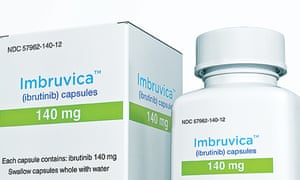Drug companies are slashing the prices of new cancer medicines to avoid having them banned from NHS use, following the closure of the Cancer Drugs Fund.
The manufacturers of four cancer drugs have dropped their prices following closure of the fund – a pot of money worth £340m a year to pay for drugs that the National Institute for Health and Care Excellence (Nice) did not find cost-effective.
The latest cancer drug to be approved by Nice for general NHS use is crizotinib, for people suffering from lung cancer. It is made under the brand name Xalkori by Pfizer, which has twice cut the list price of £51,000 per patient per course of treatment after tough negotiations. The bill for crizotinib was previously picked up by the Cancer Drugs Fund.

Nice is reappraising all the drugs that the Cancer Drugs Fund was paying for before its closure and relaunch and believes that tough new tactics with the pharmaceutical companies appear to be working. If drugs can be shown to be cost-effective they will be made available for general use, paid for by the NHS, as are other drugs. If there is doubt but the drug has potential value, it may get interim funding while data is collected to prove it is worthwhile. Others will be removed from the list of drugs the NHS can buy.
Evidence that Nice is getting tougher with the manufacturers came in a further announcement that two more drugs that were supported by the fund are set to be dropped. Everolimus for breast cancer (made by Novartis as Afinitor) and ibrutinib for mantle cell lymphoma (made by Janssen as Imbruvica) were deemed not to be cost-effective.
Related: NHS cancer patients missing out on innovative drugs
There were 41 drug treatments (some drugs have more than one use) in the fund when it closed in March 2016.
The manufacturers of three other drugs have slashed their prices as a result of the reappraisal process. The prices of bosutinib for chronic myeloid leukaemia, pemetrexed for lung cancer and cabazitaxel for advanced prostate cancer have now all been dropped to a level where Nice can recommend them for NHS use.
“Companies are finding it possible to revise their value proposition – if I can put it like that – enabling us to turn what would originally have been a ‘no’, which is why they were in the Cancer Drugs Fund, into a ‘yes’,” said Nice’s chief executive, Sir Andrew Dillon. “That is good because obviously the NHS can maintain access to that drug as opposed to having to say sorry – you are out.
“We need them to change their approach to pricing cancer products in order for us to make a significant change to the rate at which we are able to support these drugs compared to the position before the CDF was introduced.”
In its early years, the CDF was “pretty much accepting all comers”, said Dillon. Some believed pharma companies did not always try very hard to keep their price down – and their cost-effectiveness high – because they could rely on the fund to pay the price they wanted.
Nice will not say what discount the drug companies have offered, because it is confidential. However, the upper threshold for approval for NHS use is £30,000 per year of good-quality life or £50,000 for a drug given towards the end of life. Permetrexed was originally well over – at £82,000 per quality-adjusted life year (QALY). Bosutinib was originally £43,000 for QALY, rising to £65,000 and £89,000 for advanced stages of the disease.
The manufacturers, however, have not hid their anger. David Montgomery, Pfizer’s medical director of oncology, said the firm had been “forced” to offer a further discounted patient access scheme for crizotinib.
“It is not sustainable to ask companies to continuously drop the price for these medicines and it will affect our ability to make further medical progress if we do,” he said.
“Developing these medicines takes an enormous investment of time, money and knowledge, with thousands of scientists dedicating decades to discover and develop the latest treatments and cures. We have made huge leaps in scientific discoveries and medical innovation but this is a high risk industry. Post-Brexit, it is even more important that we have continued inward investment in life sciences to develop new medicines for future healthcare innovation.”
Philip Knott, director of oncology at Lilly UK, which makes pemetrexed under the brand name Alimta, said the company was delighted that Nice had finally agreed that the drug can be used in the NHS for patients whose disease progression had been slowed, after a year of uncertainty over the future of the fund. “During this time, pemetrexed for continuation maintenance had been included in the CDF, threatened with delisting twice, only to be included again on appeal,” he said. They had worked hard for a commercial agreement with the fund and NHS England.
“At last UK patients can now routinely receive a treatment regimen that has been routinely available throughout Europe for some years,” he said.
Sanofi, which makes of cabazitaxel under the brand name Jevtana, said after it was dropped from the fund it submitted new data to Nice for a reappraisal and also a new discount scheme.
“In addition, Sanofi recommended a different way of supplying Jevtana, whereby a dosage tailored to the needs of an individual patient will be made available to the NHS upon receipt of prescription,” it said in a statement.
Cancer drug companies cut prices to win NHS approval
Hiç yorum yok:
Yorum Gönder